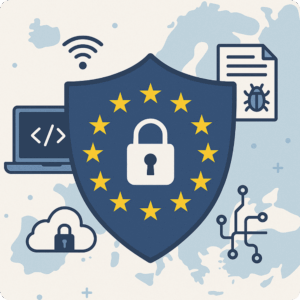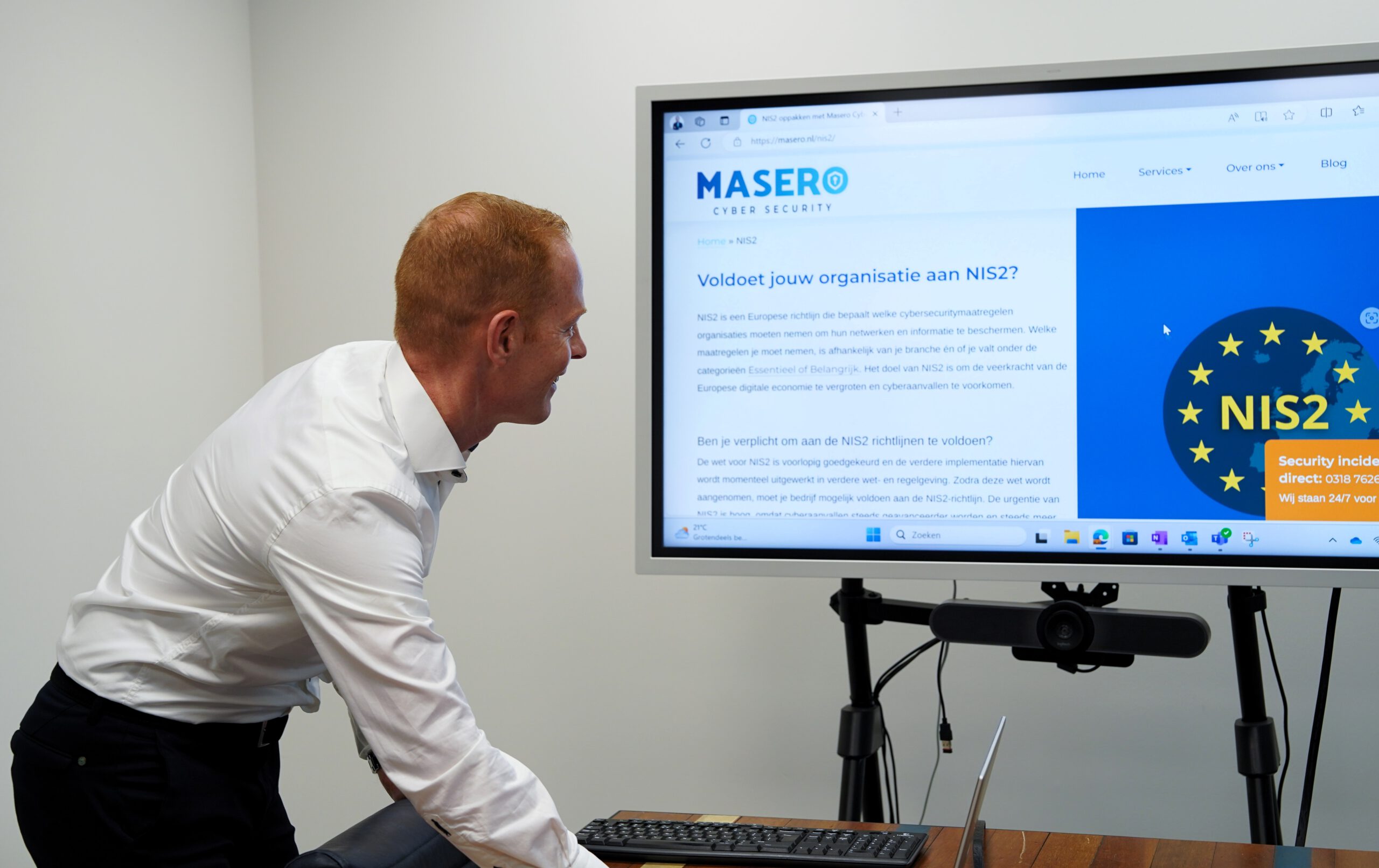Does your organisation comply to NIS2?
De kans is groot dat jouw organisatie met NIS2, en dus met de komende Cyberbeveiligingswet (Cbw), te maken krijgt. Zelfs wanneer je niet onder een benoemde sector valt, heb je vrijwel altijd te maken met ketenverantwoordelijkheid. NIS2 gaat verder dan een checklist: het vraagt organisaties om hun cybersecurity structureel, organisatie breed en aantoonbaar te verbeteren. We vertellen je op deze pagina meer over wat deze Cyberbeveiligingswet precies inhoudt, welke richtlijnen voor jou van toepassing zijn en bovenal: wat jij eraan kan doen om zo snel mogelijk aan deze richtlijnen te voldoen.
What is NIS2?
 NIS2 is de Europese richtlijn die de cyberbeveiliging en digitale weerbaarheid binnen de EU moet verhogen. De richtlijn is sinds 16 januari 2023 van kracht, maar wordt nog niet actief gehandhaafd. EU-lidstaten moeten NIS2 namelijk eerst omzetten in nationale wetgeving.
NIS2 is de Europese richtlijn die de cyberbeveiliging en digitale weerbaarheid binnen de EU moet verhogen. De richtlijn is sinds 16 januari 2023 van kracht, maar wordt nog niet actief gehandhaafd. EU-lidstaten moeten NIS2 namelijk eerst omzetten in nationale wetgeving.
Momenteel wordt er hard gewerkt aan het implementeren van NIS2 in de Nederlandse Cbw die als vervanging dient voor de huidige Wet beveiliging netwerk- en informatiesystemen (Wbni). De implementatie is al een aantal keren uitgesteld en wordt naar verwachting doorgevoerd in het tweede kwartaal van 2026.
Ben je verplicht om aan NIS2/Cbw te voldoen?
Zodra de Cyberbeveiligingswet wet wordt gehandhaafd, krijg je als bedrijf linksom of rechtsom te maken met de NIS2-richtlijn. Dit klinkt misschien nog ver weg, maar het is raadzaam om toch nu al actie te ondernemen. De urgentie is hoog, omdat cyberaanvallen steeds geavanceerder worden en steeds meer schade veroorzaken. Daarnaast heb je als organisatie een zorgplicht wat betekent dat je maatregelen met treffen om je netwerk- en informatiesystemen tegen incidenten te beschermen. Wanneer je niet voldoet aan de eisen van NIS2, loop je het risico op hoge boetes en reputatieschade. Ook kun je verantwoordelijk worden gesteld voor eventuele schade die voortkomt uit een cyberaanval.
Curious to which sector your organization belongs? Do the (dutch) free check.
Which cybersecurity measures are necessary?
Om te voldoen aan de Cbw, moet je ervoor zorgen dat de volgende zaken op orde zijn binnen je organisatie:
Beveiligingsbeleid – Een aantoonbaar, actueel beleid dat aansluit op de risico’s voor jouw organisatie.
Risicomanagement – Continue identificatie en beheersing van risico’s, inclusief technische en organisatorische maatregelen.
Incidentmanagement – Incidenten moeten kunnen worden gedetecteerd, geregistreerd, gemeld en afgehandeld volgens strikte tijdlijnen.
Bedrijfscontinuïteit – Continuïteitsplannen, back-ups en procedures moeten ervoor zorgen dat essentiële diensten blijven draaien.
Meldplicht – Incidenten moeten tijdig worden gemeld aan de toezichthoudende instanties volgens Cbw criteria.
Samenwerking met autoriteiten – Organisaties moeten relevante informatie delen en audits toestaan.
Compliance & audits – Je moet kunnen aantonen dat je voldoet, inclusief documentatie, monitoring en periodieke controles.
Cyberbewustzijn & training – Medewerkers én bestuurders moeten voldoende kennis in huis hebben. Het Cbw introduceert zelfs een opleidingsplicht voor bestuurders.
NIS2 als business enabler
Als jouw organisatie voldoet aan de Cbw en NIS2 succesvol heeft geïmplementeerd, biedt dit een sterke commerciële meerwaarde. Je leest hierover meer in onze blog NIS2 as business enabler rather than constraining obligation..
De tijd om je bedrijf hierop voor te bereiden is nu:
- Zorg voor een actuele risicoanalyse
- Werk aan beleid, incidentmanagement en continuïteit
- Breng ketenrisico’s in kaart
- Train je medewerkers en verhoog het bewustzijn
- Leg maatregelen aantoonbaar vast
Meer weten? We hebben een roadmap for you which tells you in a few simple steps if you are going in the right direction towards NIS2.
FAQs
What is NIS2?
NIS2 is the second Network- and Information Security guideline, a European law that aims to imrpove the security and resilience of network- and information systems within the EU.
Is my SMB company subjected to NIS2?
NIS2 relates to a broad variety of organisations, under which 'essential' and 'important' service providers. Even if your organisation does not belong to these categories, chances are that you will still be held accountable within the supply chain. It is possible that a customer demands compliance, even if you are technically not subjected to NIS2. The goal of NIS2 is to increase the cyberresilience of organisations within the EU.
What are the requirements of NIS2?
- Duty of care - Organizations are expected to conduct their own risk assessment. Based on this assessment, they can determine which measures are necessary to best ensure the continuity of their services and to protect the information they use. Within the various sectors covered by NIS2, additional requirements are imposed regarding the duty of care. For government organizations, this includes compliance with the Baseline Information Security Government (BIO) 2.0 framework.
- Mandatory reporting - When an incident occurs, organizations are required to report it to the relevant supervisory authority within 24 hours. This applies to incidents that significantly disrupt—or could disrupt—the continuity of services provided by essential entities. In the case of a cyber incident, the organization must also report it to the Computer Security Incident Response Team (CSIRT), which can provide assistance and support. Factors that may make an incident reportable include the number of people affected, the duration of the disruption, and the potential financial losses involved. Thresholds and criteria for specific sectors will be further defined in supplementary regulations.
- Supervision - Organizations that fall under the NIS2 directive are also subject to mandatory supervision. The directive requires that an independent supervisory authority monitors compliance with the obligations outlined in the directive, such as the duty of care and the incident reporting obligation. For government organizations, the Dutch Authority for Digital Infrastructure (RDI) has been designated as the supervisory body. When overseeing NIS2 compliance within the public sector, the RDI will make use of existing accountability structures to help minimize administrative burdens related to supervision.
What happens if I don't comply with the NIS2 requirements?
Non-compliance with the NIS2 requirements can result in sanctions, including substantial fines. The exact penalties vary by EU member state.
How can I comply with the NIS2 requirements?
To comply with NIS2 requirements, you must implement appropriate security measures, develop an incident response plan, conduct regular security audits, and report incidents. Let us help you with this process.
When will NIS2 be effective?
The implementation of and compliance with NIS2 has been delayed but is expected to be conducted in Q2 of 2026. The directive does however already grant rights to entities that are subjected to NIS2, but there is not jet a legal obligation to comply.
How does the duty of care within the NIS2 directive relate to existing directives such as NEN7510 and ISO 27001?
Within the sectors covered by the NIS2 directive, additional regulations specify how the duty of care should be implemented in more detail. For the public sector, this is done through the Baseline Information Security for Government (BIO). In other sectors, different standards may apply—for example, NEN 7510 for the healthcare sector. These standards are determined by the responsible ministries.
Do suppliers also have to comply with NIS2?
Suppliers that provide products or services to entities covered by the NIS2 directive may independently fall under its scope, but this is not automatically the case. However, entities subject to NIS2 are required—under their duty of care—to assess the security of their supply chain. As a result, a supplier can expect that a NIS2-regulated entity may request information about the cybersecurity measures the supplier has in place and/or set specific security requirements for them.
Entiteiten die onder de NIS2 vallen hebben in het kader van de zorgplicht wel een verplichting om de beveiliging van de toeleveringsketen in kaart te brengen. Een leverancier kan dus verwachten dat een NIS2-entiteit informatie opvraagt over de maatregelen die de leverancier neemt ten aanzien van cyberrisico’s en/of hier zelf eisen aan stelt.
What about the liability of the board or executive management in the event of non-compliance with the directive’s obligations within public sector organizations?
NIS2 does not introduce new liabilities for public sector executives beyond what already existed. However, this does not mean that there is no liability at all within public institutions. Currently, executives can already be held liable in cases of gross negligence, for example. Furthermore, liability of public officials is separate from the political responsibilities that exist within governmental bodies. The NIS2 directive does include a provision regarding executive liability in cases of non-compliance with its obligations. However, this provision does not directly apply to public sector entities. The directive explicitly states that it does not affect national laws concerning the liability of civil servants and elected or appointed public officials.
De NIS2-richtlijn bevat een bepaling over de aansprakelijkheid voor bestuurders in het geval van niet-nakomen van verplichtingen van de richtlijn. Deze bepaling is niet direct van toepassing op overheidsinstanties. De NIS2-richtlijn geeft namelijk aan dat geen afbreuk kan worden gedaan aan nationaal recht inzake aansprakelijkheid van ambtenaren en gekozen of benoemde overheidsfunctionarissen.
Do you need advice and support?
To comply with NIS2, you need to implement the necessary cybersecurity measures within your organization. We understand that you may not have all the expertise in-house to meet these requirements, and we’re here to support and advise you on the path to compliance. If you’d like more information or want to know how we can assist you, feel free to get in touch with us using the form below.
"*" indicates required fields


 © 2025 Masero
© 2025 Masero